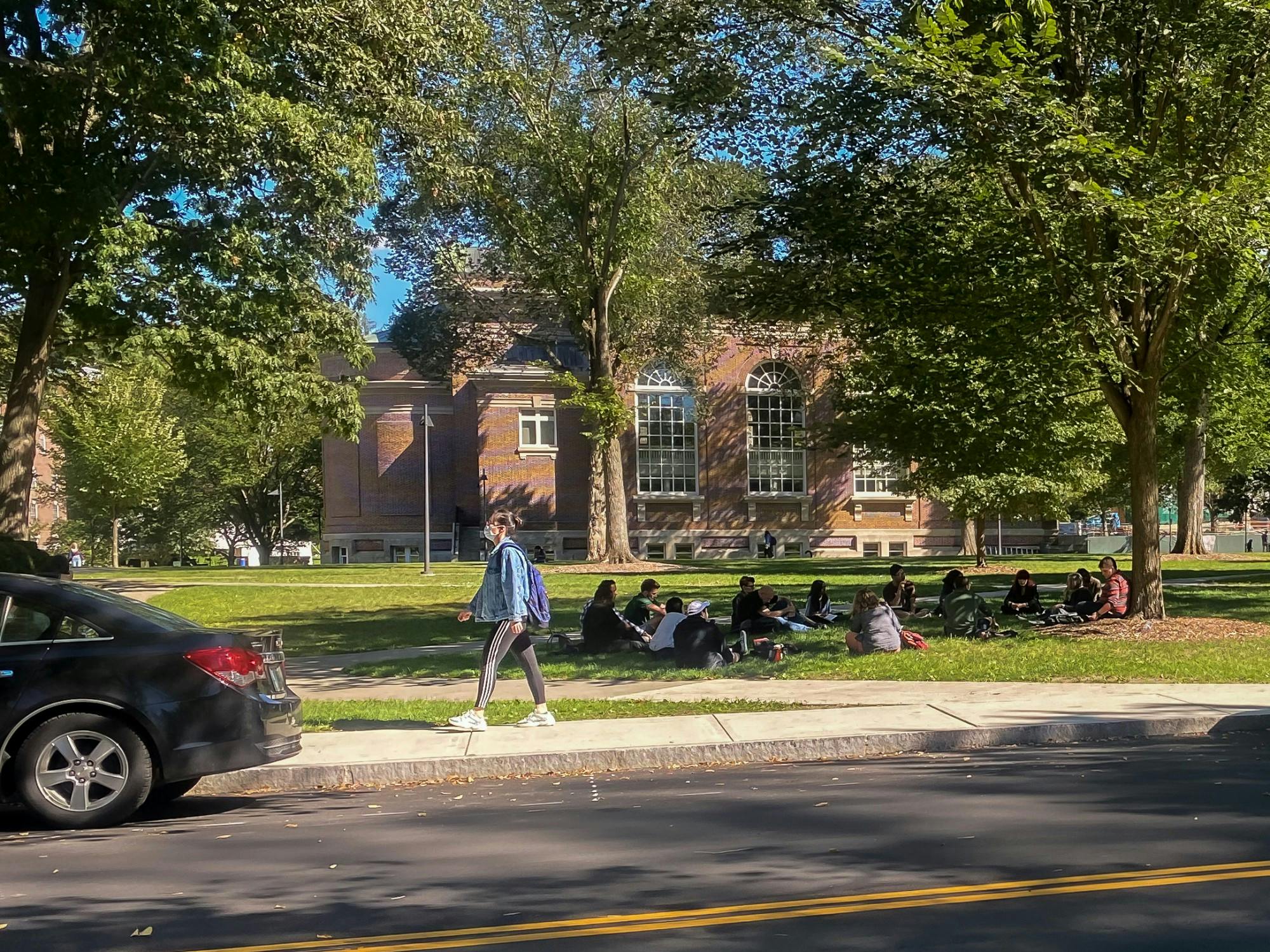As Dartmouth students settle into their first week of fall term, the College has looked to peer institutions and how they are returning to in person classes and dealing with COVID-19 outbreaks. While Dartmouth, like many other schools, has opted to reinstate an indoor mask mandate and increase testing frequency for vaccinated individuals, interim Provost David Kotz previously announced that the College is not currently considering any outdoor mask mandates, gathering restrictions or social distancing requirements.
In the Community Conversations livestream on Aug. 18, former co-chair of the recently disbanded COVID-19 Task Force Lisa Adams said that the College has been looking at how peer institutions have been reacting to COVID-19 in their fall reopening plans as a “benchmarking process,” not a “directive.” In a Sept. 15 broadcast, executive vice president Rick Mills noted that many of Dartmouth’s peer institutions experienced surges in the first few weeks after arrival, before case numbers went back down.
Dartmouth decided, in part due to outbreaks that had happened at other schools, to adjust the format of First-Year Trips at the last minute by having students return to campus each night instead of camping outdoors.
College spokesperson Diana Lawrence wrote in an emailed statement that it is difficult to predict what policy changes might be needed in the future if Dartmouth faces a spike in COVID-19 cases. She added that the College’s objective in its making policy is to keep the campus open, maintain the student experience and minimize the risk for anyone — especially those who cannot be vaccinated — that falls seriously ill from COVID-19.
As of Monday, there are 12 active cases on the COVID-19 dashboard – 10 among undergraduate students and 2 among faculty and staff. An additional 5 faculty and staff are in isolation.
Within the Ivy League, all schools have either maintained or reimposed indoor universal mask mandates for students, regardless of vaccination status. All of these schools have also implemented some required surveillance testing for vaccinated individuals, though the frequency of testing is varied. Like Dartmouth, Princeton University, Yale University and Cornell University require once weekly testing for all vaccinated individuals.
Harvard University, meanwhile, requires testing three times per week for all students living in on-campus housing, but only once per week for those living off campus. Likewise, Brown University has mandated twice weekly testing for students. The University of Pennsylvania requires testing twice per month, whereas Columbia University “randomly selects” a portion of students, faculty and staff to test each week.
While Dartmouth’s Ivy League peers have maintained COVID-19 restrictions, they have had varying degrees of success in limiting spread of the virus on their respective campuses. Both Princeton and Penn have not seen any evidence of transmission on campus. Over the week of Sept. 4 to Sept. 11, Princeton reported a campus positivity rate of 0.09%, whereas Penn had a positivity rate of 1.11%.
However, other Ivy League universities have had to implement more stringent measures to combat the delta variant. For example, in response to an uptick in asymptomatic transmission, Brown halted indoor dining, required all student groups to meet online and restricted social gatherings to five people or fewer. Due to similar increases in transmission, Columbia restricted indoor gatherings to 10 or fewer individuals, and Cornell implemented an outdoor mask mandate and canceled most of its Homecoming events.
Among other peer institutions in New England, both the University of New Hampshire and the University of Vermont have recorded upticks in cases. As of Sept. 14, UNH had 157 active cases on campus, and as a result opted to expand its mask mandate to all indoor spaces and barred non-school visitors from entering dormitories. The University of Vermont has seen 44 cases among students, faculty and staff since Sept. 6.
Other liberal arts colleges in the northeast have also implemented restrictions in response to the threat of the delta variant. Bowdoin College closed indoor dining and banned private gatherings after 14 students tested positive over two days. Amherst College, citing the variant, moved to require double masking indoors, banned events with alcohol and restricted students from going to bars and restaurants in the town of Amherst. The move sparked significant student backlash, which prompted the College to partially reopen indoor dining, expand its travel radius and allow registered social events.
While many colleges and universities around the country have returned to in-person learning, some have also shifted to remote learning in response to outbreaks. Rice University delayed the start of its fall semester by two days, imposed an indoor alcohol ban and moved all classes online for the first two weeks due to a rise in COVID-19 infections of vaccinated individuals.
Connecticut College temporarily transitioned to remote learning, shut down athletic practices and banned indoor gatherings after 169 students tested positive in one week. Similarly, the University of Dallas suspended in person classes for two weeks when it ran out of on campus isolation housing. However, unlike Dartmouth and many other colleges, the University does not have a vaccine mandate for its students.




